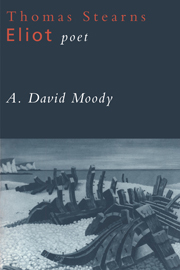Book contents
- Frontmatter
- Contents
- Acknowledgments
- Preface to second edition
- Introduction
- 1 The growth of the poet's mind
- PART ONE 1905–1912 – AN INDIVIDUAL TALENT
- Oxford University Extension Lectures
- PART TWO 1912–1922 – ‘SHALL I AT LEAST SET MY LANDS IN ORDER?’
- PART THREE 1922–1930 – ‘ORDINA QUEST’ AMORE, O TU CHE M' AMI'
- PART FOUR 1931–1939 – THE WORD IN THE DESERT
- 7 The design of the drama
- 8 Dust in sunlight
- PART FIVE 1939–1945 – APOCALYPSE
- AFTERWORDS
- APPENDICES
- Notes
- Index
8 - Dust in sunlight
Published online by Cambridge University Press: 05 February 2012
- Frontmatter
- Contents
- Acknowledgments
- Preface to second edition
- Introduction
- 1 The growth of the poet's mind
- PART ONE 1905–1912 – AN INDIVIDUAL TALENT
- Oxford University Extension Lectures
- PART TWO 1912–1922 – ‘SHALL I AT LEAST SET MY LANDS IN ORDER?’
- PART THREE 1922–1930 – ‘ORDINA QUEST’ AMORE, O TU CHE M' AMI'
- PART FOUR 1931–1939 – THE WORD IN THE DESERT
- 7 The design of the drama
- 8 Dust in sunlight
- PART FIVE 1939–1945 – APOCALYPSE
- AFTERWORDS
- APPENDICES
- Notes
- Index
Summary
Only by the form, the pattern,
Can words or music reach
The stillness
Burnt Norton, composed in 1935, is in every sense the central work in Eliot's verse between 1931 and 1939. It grew out of Murder in the Cathedral, and it led on to The Family Reunion. First published as the conclusion to Collected Poems 1909–1935, it seemed the culmination of his ‘pure, unapplied poetry’, and, to Eliot himself, its end. Only with the war did it prove to have been incomplete, and to require the three further Quartets.
The other poems of the decade, after the ‘unfinished’ ‘Coriolan’, are minor, or simply amusements. Old Possum's Book of Practical Cats, mostly written in 1934–6, show the poet practising his technique behind the mask of the comic versifier. The eleven minor poems have more to them than that: they reveal in an accessible, even intimate way, something of the author of Burnt Norton.
‘Five-Finger Exercises’, published in the Criterion in January 1933, were probably written before Eliot left for America in the autumn of 1932, to lecture at Harvard. There is a mordant wound beneath their wit. The prevalence of animals, and the lightness with which much learning is alluded to, would suggest an unbending towards pleasantry. Yet ‘How unpleasant to meet Mr Eliot!’ His prim and grim sense of Time and Mortality is the burden of these lines, and they are not disposed to be kind to the animal.
- Type
- Chapter
- Information
- Thomas Stearns Eliot: Poet , pp. 182 - 200Publisher: Cambridge University PressPrint publication year: 1995



